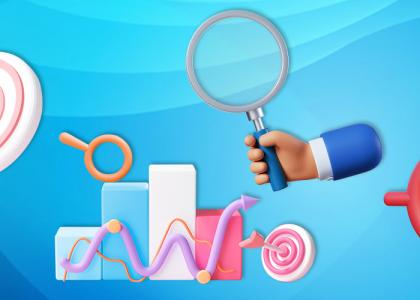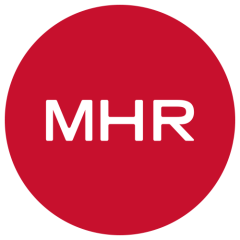Your workplace needs more WOW. Get ready for MHR's World of Work 2026
What is 'people focused' ERP and why does it matter?

Enterprise resource planning (ERP) software has long been used by enterprises to integrate their main business processes and enhance productivity.
However, as the environment businesses are operating in becomes more turbulent, digital, transient and interconnected, traditional ERP solutions need to evolve.
In our research-based whitepaper Business Resilience And The Forgotten Middle, we looked at how building resilience is vital to successfully navigate uncertainty and respond quickly to the unexpected. We discovered that 85% of mid-sized UK businesses think that there are areas that they need to change significantly to increase their level of business resilience.
We see a resilient business as one that has good capability across the Three Is:
The Three Is of Business Resilience:
- Inspired individuals - you are able to effectively recruit, lead, empower and energise your most valuable resource: your people.
- Insightful information - you can deliver the accurate inputs, outputs and reporting that are fundamental to good decision making and compliance.
- Intelligent integration - your data, systems and teams are brought together in a user-friendly, secure way for superior visibility and agility across the entire business.
Central to the Three Is is people enablement. Without the right tools bringing together the right expertise and information in a way that is easily accessible and digestible, your people won’t be inspired or able to make the right decisions at the right time to keep your business thriving through uncertainty.
The fixed, operationally focused ERP that once delivered huge benefits for organisations over multiple years in a stable operating environment, could be holding you back from making change when conditions are more volatile. In today’s operating environment, what is needed is enterprise planning with a brain and a heart that can enable an organisation to flex and change as needs arise. It needs to be driven by people who have the tools and insight at their fingertips to collaborate, motivate and make good decisions.
Traditional ERP
Gartner defines Enterprise Resource Planning (ERP) as: “The ability to deliver an integrated suite of business applications.” i.e. bringing together end-to-end operational processes based on a common data source to provide standardisation and efficiency. Typically, ERP is focused on integrating processes such as accounting, payroll, procurement, risk management, compliance, and supply chain operations. It is very process driven with the objective of driving efficiency through standardisation.
The ‘people focused’ difference
In the context of the Three Is, traditional ERPs can help with process and data integration to provide insightful information from business metrics. While process standardisation and efficiency are vitally important to the successful functioning of a business, we believe that an ERP built around data and processes alone is missing a vital ingredient. People. Data and systems alone do not drive a business forward – this is done by inspired individuals; the people that use the data and systems to make decisions.
To thrive in this increasingly complex and unpredictable business environment, you need a system that enables people to be informed, empowered, developed and rewarded (and paid!). This is why we feel that it is vital to have people at the centre of your ERP.
A people-focused ERP takes enterprise resource planning beyond operational by giving employees the insight, agility and control they need to drive the business forward. It has all the elements that you would expect from a standard ERP, such as finance and payroll, but it adds comprehensive people features, such as recruitment, learning management, talent management and employee engagement.
How does this work in practice?
Here are a couple of examples of how adding people-focused features can enhance your ERP:
- Identify skills gaps: having the ability to analyse your organisation’s learning needs can highlight skill gaps e.g. in financial modelling, which can be addressed quickly through your learning management system or recruitment process. This would equip your finance team with the ability to use their ERP analytics tools to effectively forecast future scenarios as an input to business planning and decision making.
- Enable a decentralised approach: when ERP is fully integrated with the best solutions for reporting, analysing, modelling, collaborating and communicating, decisions can be made quickly and easily within lines of business without having to defer to centralised data gatekeepers. This can facilitate a culture change to empower your people to make the most of the information that your ERP provides.
The benefits of a ‘people focused’ approach
The following are just a few examples of the benefits delivered by a people-focused ERP system:
- Ensures that the people are fully trained and motivated, and aligned with the organisation’s goals and objectives, to make the most of the data and insights that it provides
- Puts decision makers on the front foot by ensuring that the right business, financial and people information is communicated and shared with those that need visibility at the right time
- Enables managers to act on data and pro-active alerts to make changes to the business to maintain competitive advantage (e.g. early warning of potential skill shortages or gaps in succession planning)
- Helps you to nurture and develop your valuable talent through strong performance management, learning and communication tools, to help employees achieve personal career goals
- Makes employees feel valued and empowered through recognition tools, instant feedback and endorsements and collaboration groups
Ultimately, a people-focused ERP helps your business to be more resilient by giving your people the tools, insights, training, and motivation that they need to understand their business environment and initiate changes to keep one step ahead.
Find out more
If you would like to find out more about implementing a people-focused ERP, MHR is ideally placed to help you. Why not take a look at our ‘buyers guide to HR, payroll and finance systems’ or click here to request a call back or a demo of our platforms.

